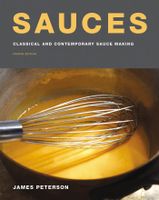🍝 Enjoy the cooking of Italy and save 25% on ckbk Membership 🇮🇹
Successive Caramelization
Published 1991
The majority of classic brown sauce recipes combine raw or gently sweated aromatic vegetables with wine or stock before adding demi-glace. The flavor of these sauces can be greatly improved if the aromatic vegetables are cooked long enough with meat trimmings or ham so that their juices fall to the bottom of the saucepan and lightly caramelize. This process can be repeated by moistening the ingredients with stock, wine, or water and reducing the liquid until it forms a glaze and caramelizes a second or third time on the bottom of the pot. When the vegetables and meats used for the sauce base have been caramelized in this way, they are ready for the final moistening with demi-glace. After the final moistening, the glazed vegetables and meat trimmings should not be simmered for more than 45 minutes, or the deep, meaty flavor brought out by successive caramelization will be lost. In classic French sauce making, this technique is called faire tomber à glace (literally, “to cause to fall to a glaze”).
Become a Premium Member to access this page
Unlimited, ad-free access to hundreds of the world’s best cookbooks
Over 150,000 recipes with thousands more added every month
Recommended by leading chefs and food writers
Powerful search filters to match your tastes
Create collections and add reviews or private notes to any recipe
Swipe to browse each cookbook from cover-to-cover
Manage your subscription via the My Membership page
Part of
Advertisement
Related Recipes
-
-
-
-
Related Reference
-
-
-
-
Advertisement



